Humanity is undergoing a civilizational phase shift. An old world is dying, giving way to the birth of a new, as different in character as a butterfly from a caterpillar. Though the transition appears to be happening on multiple fronts - energy, intelligence, and capital - it’s all part of one greater force. Buckminster Fuller called it the ephemeralization of everything. The shift from nouns to verbs and stocks to flow.
In concrete terms, the rapid evolution of artificial intelligence has captured the world’s imagination. Intelligence is being liberated from the minds of primates and expanding rapidly into the noosphere. This is now well acknowledged. What is quickly dawning on society, however, is the implication of this explosion. If old world intelligence was powered by human metabolism then what will power the new? Electricity of course.
There is No Top: The Electrification of Intelligence (and Everything Else)
This new demand for electrons is only the latest development in the larger transition which energy nerds have been charting for decades: the electrification of everything. From cars to heat pumps to IoT devices - it’s all being electrified. Everything everywhere all at once. But it’s the vertical and insatiable demand for power needed to feed the hungry AIs which is causing the mainstream to wake up to the consequences of this transition. Namely that there is nowhere near enough electric power generation capacity necessary to fuel existing demand, let alone the coming exponential growth. A few data points on the current state of the world:
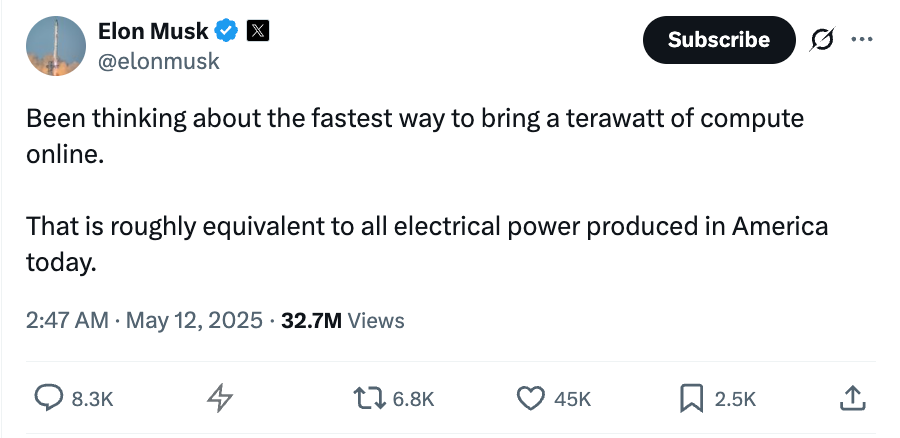
And this is all just the beginning. The only analyst who’s been anywhere nearly bullish enough on the coming demand for compute is former OpenAI researcher and current hedge fund manager, Leopold Aschenbrenner, who predicted in his 2024 report, Situational Awareness, that we’ll see 100 GW clusters by 2030 (still far less than Elon’s 1 TW goal). And that’s just for one company’s (or country’s) training runs! Nevermind the even greater demand for inference…
While some might argue that much of this coming usage will be offset by efficiency gains - e.g. see Google’s 33x inference improvements over the last year - I think they ultimately underestimate both the power of Jevons paradox (as something gets cheaper, people use more, not less of it) and society’s unlimited appetite for energy, especially as AI assisted breakthroughs enable new energy-hungry sci-fi undertakings such as synthetic biology and space colonization. Ultimately, I think even the most bullish are too bearish - whenever you see a J curve, never take the under!
The Grid Can’t Take It
Regardless of where you think demand actually tops out (if there is a top…), it’s quickly becoming conventional wisdom that we cannot meet the power demands of AI with our current generation capacity, let alone fuel the larger electricity transition underway or the future demand from yet un-birthed technologies like quantum computers or ubiquitous robots. It’s also becoming widely accepted that even if we could somehow build enough generation capacity to meet coming demand, our existing electric grid could not interconnect the necessary load or generation anywhere near quickly enough. A few more data points:
The Race with China
These are all now generally accepted facts. Furthermore, it’s becoming painfully obvious that if power becomes a major limiting factor for the intelligence explosion (second perhaps only to the chips themselves), then the United States is in quite a pickle. That’s because China is racing ahead of the US in deploying new capacity, most of it solar + storage. Here are two charts to give you an idea of what’s happening in China.
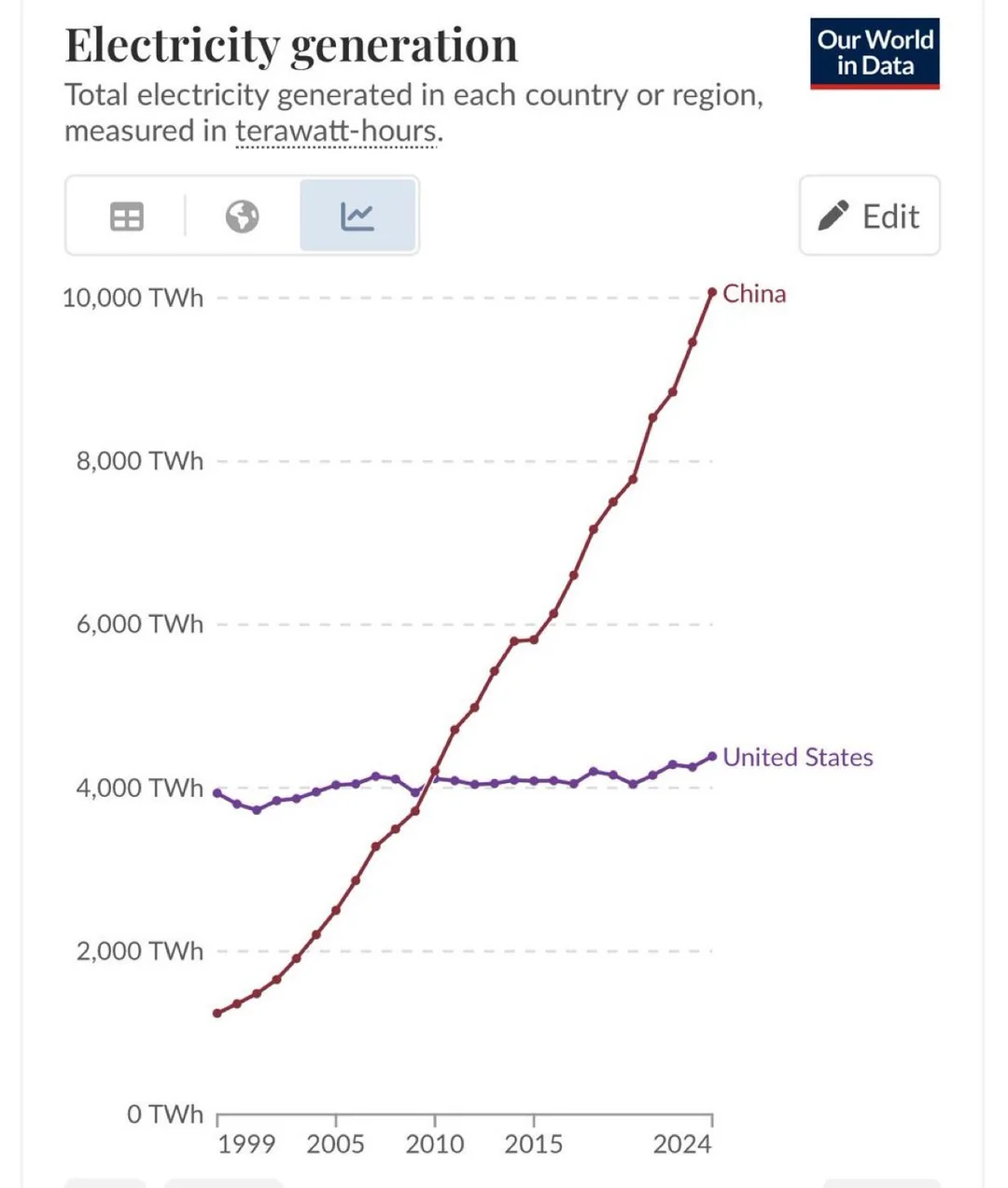

And a few images for good measure:



At this rate, solar power in China will exceed ALL sources of electricity combined in the US within 3-4 years. More on solar in a moment. The big takeaway here is that if power becomes the limiting factor to birthing and serving superintelligence, then we either figure out how to match/exceed Chinese installation speed…or start learning Mandarin.
So far, nothing I’ve shared is particularly controversial. These are all just facts. Where things begin to get interesting is in the potential solutions. How can the US catch up to China? Several ideas are being bandied about:
Each of these ideas has merit and I hope they all get traction. But color me (very) skeptical that any will solve the problem within a reasonable time frame. Slashing regulation is great (and necessary), but it doesn’t solve the more fundamental problem that our grids are physically unable (in their current sclerotic states) to accommodate orders of magnitude more generation / load. Nuclear is a promising long term piece of the puzzle. But there’s no way it’s deployment ready by 2030, by which time China will have surged perhaps impossibly far ahead. And that’s to say nothing of my skepticism of it competing on price. Off-grid natural gas will certainly be part of the solution. But it’s limited for many reasons - chief among them the shortage of turbines through the early 2030s (and, like nuclear, ultimately the cost). Making data centers more flexible is an excellent idea which should also absolutely happen. A recent paper projects that data center flexibility could optimistically and eventually enable ~100 GW of new load. It’s a great start, but barely moves the needle on the multi-TW scale amount of generation/demand I think is coming.
¡Viva La Revolución Solar!
So where does that leave us? I believe there’s one answer which outshines the rest: building solar and storage. And building A LOT. I suppose it’s now time that I come out as a solar maximalist, which I’ve been since ~2014, when I was part of the founding team of Bright, a leading solar company in Mexico. Why? Like Leopold, I trust the curves. I’ve followed the cost of solar carefully for over a decade and observed a Moore’s law like relationship - every doubling in cumulative capacity deployed has decreased the LCOE (levelized cost of electricity) by ~30-40%. Just like clockwork.
Solar, of course, has one major and very obvious problem - you can’t use it for at least half the day when the sun doesn’t shine. Fortunately, there's another obvious solution that’s finally ready for prime time: batteries. Lithium-ion batteries have a similar deployment > cost relationship with a slightly less steep curve: every doubling of cumulative capacity leads to a 20-25% reduction in the end cost of electricity storage. Just like clockwork. And the more of each we deploy, the cheaper they get. It’s a beautiful feedback loop :)
I wrote about these ideas and curves extensively in 2020/21 when I was investing at Version One Ventures (see: The Energy Revolution is (Finally) Here, Zero Marginal Cost Energy, and The Solar Bitcoin Convergence). I was also the lead author on a widely cited 2021 Square/Ark Invest paper called Bitcoin Is Key to an Abundant Clean Energy Future (which was effectively my investment thesis in Satoshi Energy, one of my all time favorite companies).
At the time when I published each of these essays, many thought me mad. And yet the curves have simply continued along their inevitable march. And it seems we’ve finally reached a tipping point! Lazard’s latest LCOE report (a mainstay energy nerd read for nearly 20 years) shows that as of 2025, building new solar + storage is cost competitive with (and generally cheaper than) operating existing natural gas (here’s a readable summary). Even when completely unsubsidized. And, again, it’s only getting cheaper as a function of increased deployment. I should note that tariffs ultimately amount to nothing more than speed bumps for the larger forces at play.
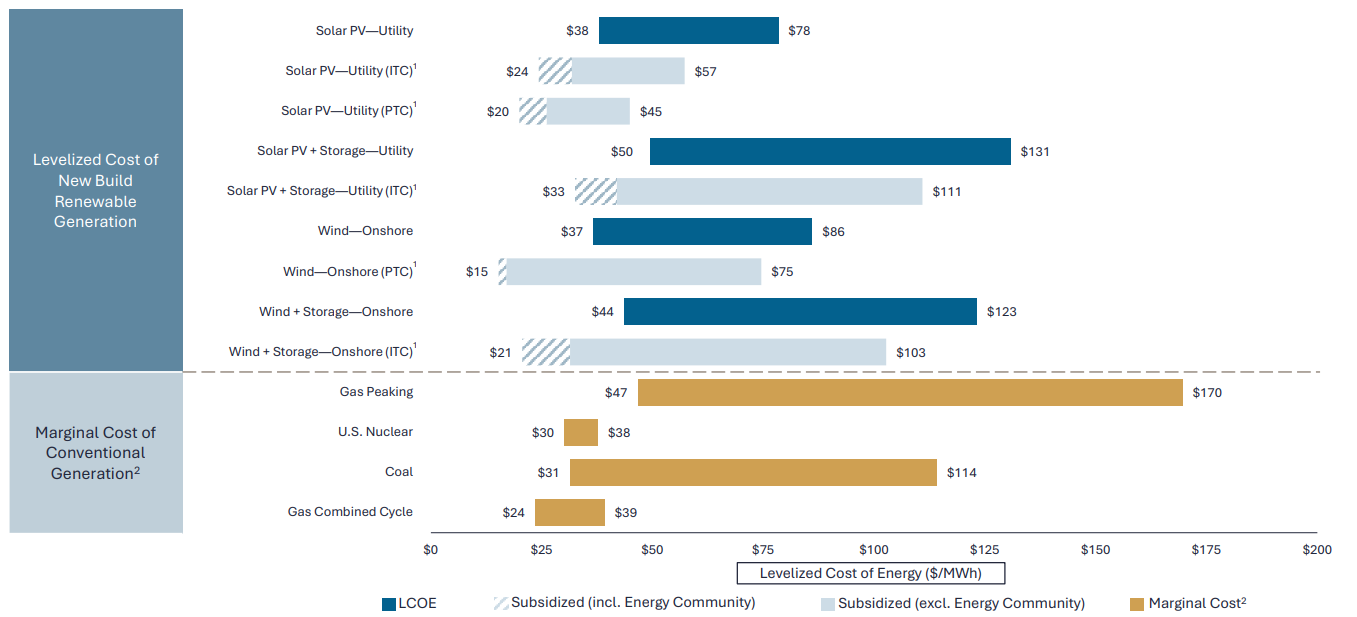
Lazard: Building solar+storage (unsubsidized) competitive with / cheaper than building new nat gas
I, of course, am not the only one to have observed these curves. In fact, I was first solar pilled by Ramez Naam’s excellent blog approximately a decade ago. As I’ve been going back down the rabbit hole, I’ve been devouring the essays of Casey Handermer, who maintains one of my favorite blogs on the web today. I’m also extremely impressed with this in-depth report from Ember energy, which gets into the nitty gritty details. And then there’s one other guy who’s also fully solar + battery pilled: Elon Musk.
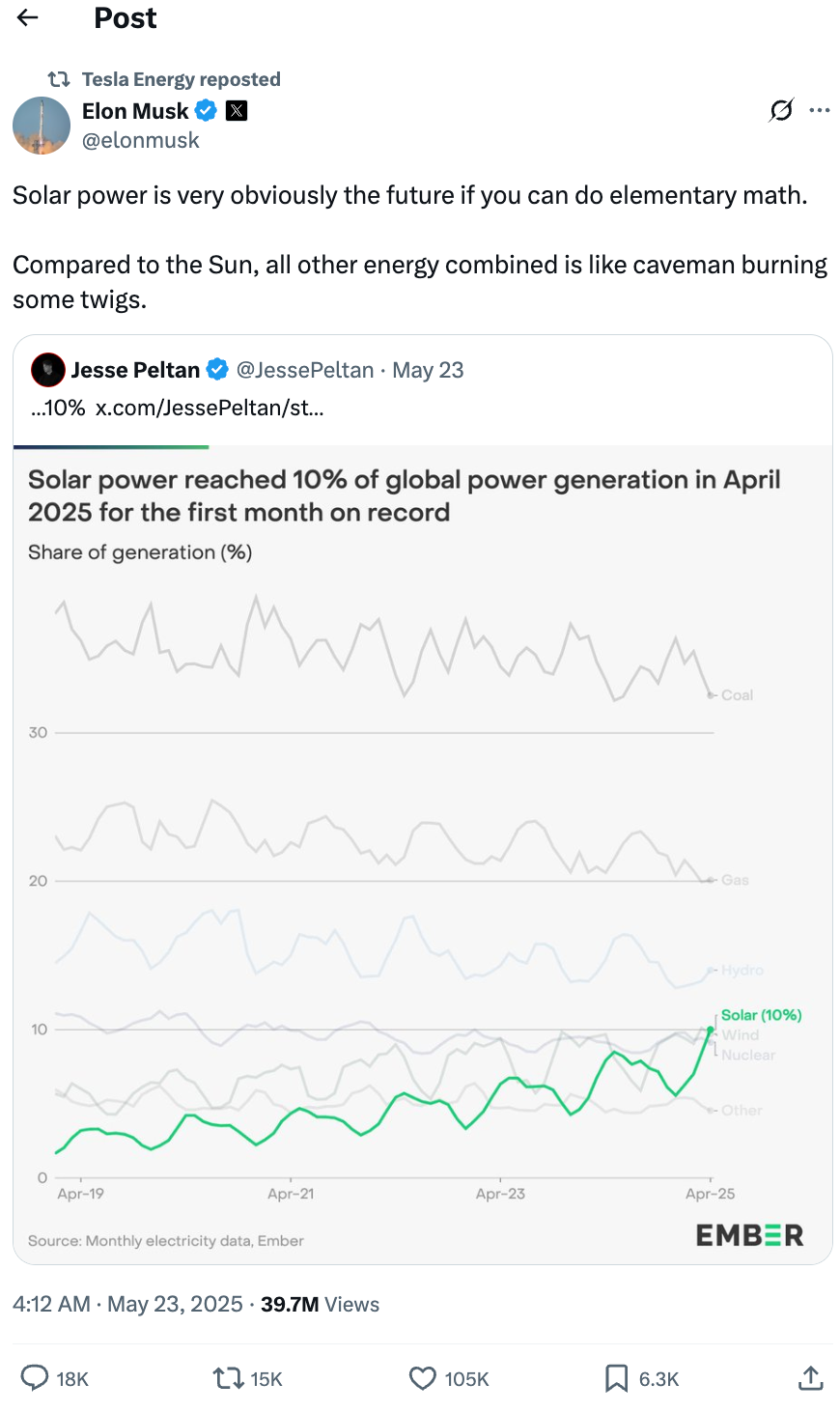
As it turns out, he’s been a solar maxi for some time. His Tesla master plan is one of the most important yet underread documents on the Internet. It lays out where we’re heading with solar + storage quite nicely from here.
And in an increasingly cost insensitive compute driven world, solar + storage has an even greater advantage than rapidly declining costs: speed. Installing solar + storage is likely the fastest way to stand up a new data center today (at least once all of the nat gas generators are spoken for). Critically, this can be done off-grid and co-located with the data center, allowing developers to skip the 5 year interconnection queue and begin operation as soon as steel and silicon are in the ground.
Up until recently, this idea was mostly theoretical. This fascinating report from late last year detailed how to build an entirely solar + battery powered off-grid data center. While it was fun to imagine, most with whom I discussed it thought it wouldn’t actually materialize for years. But they were wrong. JB Straubel, co-founder and board member of Tesla, made it a reality this summer with the announcement of Redwood Energy, a new business unit of Redwood Materials, which recycles Lithium-ion batteries. They concurrently announced the completion, with Crusoe, of a 12 MW entirely off-grid solar + recycled battery data center.
It was recently reported that xAI, another Elon company, is building 500 acres of solar to expand its Colossus data center in Memphis (an event which for anyone following their land purchase filings would have been obvious for some time ;) While each of these projects are relatively small today, as with everything in Elon’s universe, just watch how quickly they scale...
Perhaps most exciting of all, Google made a major investment in Intersect Power in late 2024 predicated on a similar thesis. Together, they plan to develop ~$20B worth of primarily solar/storage powered data centers, including 1GW and 3+ GW campuses set to go live in 2026 and 2027. While it’s unlikely that these sites are entirely off-grid (as it seems they’ll have backup nat gas and/or grid interconnection for resilience), they’re still a major testament to what’s possible with solar + storage. And remember, the more solar and batteries we deploy, the cheaper it all gets. Feedback loops for the win!
For whatever reasons, most of Silicon Valley has been unable or unwilling to accept the reality of solar + storage scaling curves, instead betting heavily on new technology breakthroughs like nuclear. That’s changing quickly though. I’ve seen former skeptics with newly found open minds after listening to Casey’s recent appearance on the Dwarkesh podcast. I expect that, as Casey predicts, primarily solar + storage data centers will become the norm within the next two years. It seems that our aforementioned solar maxi agrees…

Slowly but surely my long held contrarian theses are reaching the mainstream. But fear not, I have a few heretical ideas and predictions yet ;) While I generally agree that solar + storage is getting too cheap to interconnect and that the future of electricity is local, I also strongly believe in the long-term cost and reliability advantages of networked, emergent intelligence via cooperation and free trade. I also generally agree with Sam Brandin’s take that most criticisms of existing power markets (including transmission and distribution costs/queues) are directly downstream of central planning and its inherent inefficiency. In other words, if we were able to unify all of the legacy utility planning process and multiple unrelated markets into one market with real-time price signals, we could solve most of our current problems.
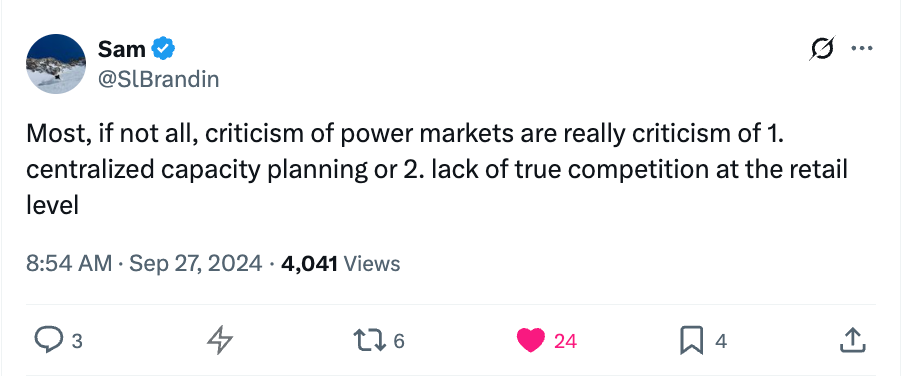
In the ideal world, all of the coming solar and storage (and other generation sources with uniquely cheap geothermal, wind, gas, hydro, etc. in specific geographies) would be linked together in federated fractal grids allowing for the free flow of electrons in unfettered markets, creating the lowest cost electricity, best black swan insurance, and most prosperity/resilience for all. Such truly open, federated grids would extend the beauty of spontaneous order to the most fundamental building block of our reality: energy itself. This world, of course, is not the world in which we live. But it could be… if only there was some sly, roundabout way to defect from the existing grid and build anew ;)
How To Build a New Grid
Here’s a high level vision for how a fractal grid might emerge:
1) Build GW scale off-grid solar/storage co-located with a data center customer
Choose a geography with the most permissible regulations. Ideally, the location will also have proximity to population centers for low latency inference (and other future uses), high solar irradiation for the lowest cost solar power, and proximity to additional energy sources to provide additional resilience (e.g. natural gas pipelines, geothermal, hydro, or wind).
Texas - with the freest electricity markets, least regulations, and incredible solar/wind/gas resources - is by far the most likely geography in the United States. Paces estimates that West Texas alone boasts enough land to host more than 1,200 GW of off-grid solar + storage capacity (with proximity to natural gas pipelines for backup), 95% of which is privately owned. If you relax the natural gas requirement and add wind or just plan to further overbuild solar/storage, then you’re looking at most of the state of Texas (and most of the Southwest for that matter). As a brief aside, another option for backup might be to overbuild solar and create synthetic nat gas on-site without the need for access to pipelines.
An additional area I plan to examine closely is tribal lands which are primarily located in the sunniest region of the Southwest (near Arizona/New Mexico) and technically sovereign, theoretically allowing for much more relaxed regulations. There are, of course, a ton of historical challenges to building on these lands, but it might just be the most creative solution.
If all options in the U.S. prove too challenging, then I’d look carefully at countries with close proximity to and natural alliance with the US, which might be more open to radical new development. Mexico, El Salvador, and Honduras all come to mind immediately.
2) Add additional customers and solar/storage capacity over time, expanding into a macrogrid
Note that this scalability/flexibility is a unique advantage of the modular nature of solar + storage compared to the fixed nature of nuclear or natural gas power plants. With fresh excess capacity, new loads can gradually move to these sites. Eventually, I would expect to see new cities themselves spring up wherever the cheapest power emerges. I can easily see this become a driving force for population growth similar to what we saw with urbanization during the industrial revolution. Probably bigger. And perhaps this is the way that something like the network state actually emerges.
As you begin serving more customers, you risk tripping new regulatory challenges. But depending on where you build, you should theoretically be able to reach TW scale as long as you don’t interconnect with the grid itself. While most microgrids are currently single digit MWs at most, there is precedent for scaling up to 400 MW in Saudi Arabia. And there’s no technical constraints to going even bigger.
3) Establish new, decentralized markets
In order to balance the power and load in these growing macrogrids, we’ll need new system operators (i.e. marketplaces) to balance and dispatch power in real-time at actual market clearing costs, replacing the existing boondoggle of various planning processes and unrelated markets (e.g. energy, day ahead, and ancillary service markets) that exist today. Since they’ll be operating from a blank slate with modern software and assumptions around real-time data and edge prosumers baked in from day 0, I expect these new markets to be incredibly efficient, driving costs for consumers lower than even the most ardent bulls are projecting. While these market making opportunities could be massive opportunities for companies, I’m hopeful that they could eventually be managed at the protocol level. More on that to follow.
4) Connect the dots
If this model succeeds at one spot, then I expect to see many ambitious entrepreneurs follow suit in other locales. The positive feedback loops of radically cheaper power on new macrogrids alongside ever-rising legacy utility costs will lead to the acceleration of the utility death spiral and increasing defections from grids governed by weary giants of flesh and steel.
I, of course, expect to see meaningful pushback from dying utilities, but at this point the macrogrids will be sufficiently large and prosperous (backed by their own centers of financial and government power - e.g. big tech) to fight back. And win. Some particularly bold entrepreneur (Elon?) may go full cowboy and interconnect existing islanded macro grids and deal with the ensuing lawsuits. Eventually, the legacy grids will also agree (or more likely ask!) to interconnect with the new macrogrids as they will be (literally and figuratively) out of power.
To be clear, this step is the least certain and has a lot of what-ifs. If this saga takes too long to play out in the US, then perhaps the path to connect macrogrids will first happen in more permissive Latin American countries, the success of which may eventually prompt the US to act as well.
5) Usher in an intercontinental grid
While this final step is certainly the most imaginative and least realistic for now, I’d be remiss not to lay out a beautiful vision for interconnecting the formerly disparate macrogrids into an intercontinental grid as envisioned by Buckminster Fuller, an act he believed would be crucial for promoting global peace and prosperity via trade and interdependence. Check out this fascinating post for an idea of how this could look. Note this idea will likely require cheaper large scale interconnection technology than we currently possess, as I generally agree with the take that HVDC power lines are too expensive to make sense (for now). While it may be decades away from commercialization, recent advances in wireless energy transmission (currently the domain of DARPA) point toward one potential future, the dream of another visionary, Nikola Tesla: the World Wireless System (WWS). But to be clear, this is still sci-fi for now ;)
The Internet of Energy
The dream is grandiose but the mission clear: to build a new, fractal grid as a path toward establishing an Internet of Energy, freeing electrons (and intelligence) in the same way that the Internet freed information. The details of how to operationalize such a radical future are murky at best, but I have my own ideas on the technology stack which, similar to the Internet’s OSI model, will best enable it:
While I’m obviously driven by the mission of human freedom, I’m increasingly convinced that the opportunity of building a solar/storage driven Internet of Energy is also the largest investment opportunity in the world. Which makes total sense given that energy is upstream of literally everything else. Funding/incubating as many pieces of this puzzle as possible is my top priority at Hivemind Ventures. So much so that I’m organizing a Type I Summit (in the Kardashev scale sense) in San Francisco in early November to gather the brightest and most open-minded entrepreneurs and investors working in power markets and data centers to join me in imagining what needs to get built. My hope is to leave the event with investments in multiple solar pirates ready to sail these uncharted, electrical high seas. We’ll have limited space, but if this sort of crazy talk sounds like your jam, then apply here to join:
npub copied to clipboard
ok